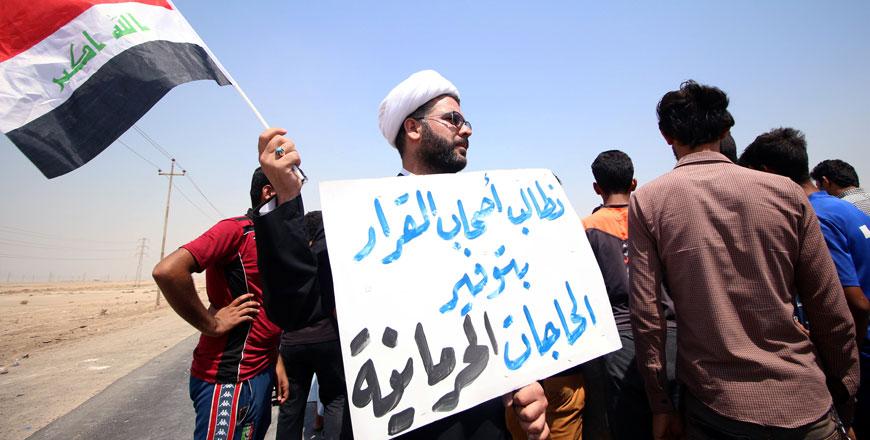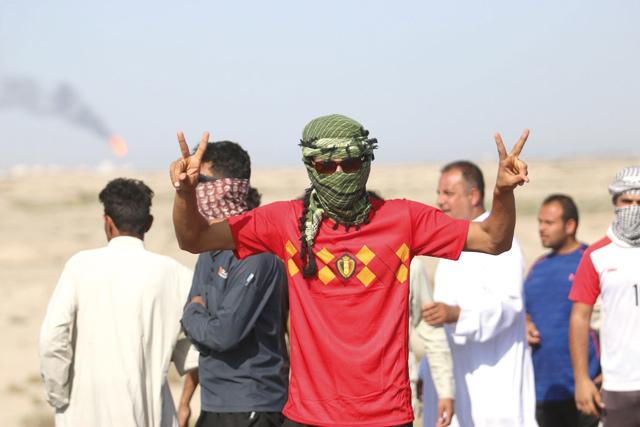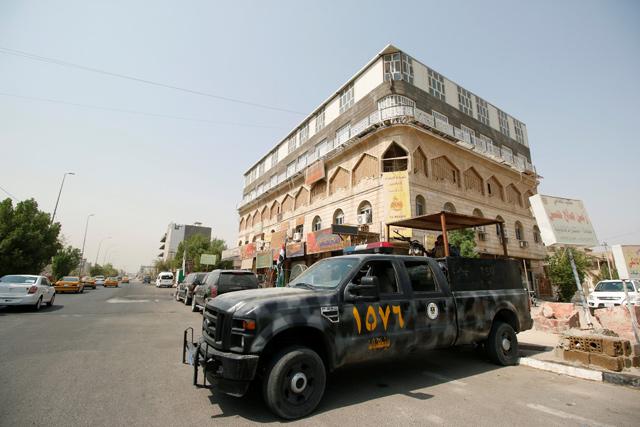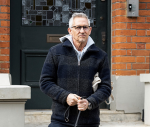You are here
Iraqis demand change as protests run into second week
By AFP - Jul 16,2018 - Last updated at Jul 16,2018

A protester holds a sign that reads ‘We ask the decision-makers to provide the things we are deprived of’ during a protest in south of Basra, Iraq, on Monday (Reuters photo)
BASRA, Iraq — Protests in Iraq continued into their second week on Monday following days of clashes that left six people dead, with demonstrators rallying to put social problems in the spotlight.
Months after Iraq declared victory over the Daesh group, attention has turned from the military battle to the fight for jobs and public services.
Thousands of people rallied in fresh protests on Monday in the eastern province of Diyala and the southern city of Nasiriyah, according to AFP correspondents.
Iraqis already made their dissatisfaction with their leaders known through massive abstentions in May’s national elections, and now citizens are taking to the streets to demand they see benefits from the country’s vast oil reserves.
“These oil fields belong to us, yet, we get nothing,” said Hussein Ghazi, a 34-year-old protester in the port city of Basra.
The oil sector accounts for 89 per cent of the state budget and 99 per cent of Iraq’s export revenues, but only 1 percent of jobs, as the majority of posts are filled by foreigners.
Officially, 10.8 per cent of Iraqis are jobless, while youth unemployment is twice as high, in a country where 60 per cent of the population is aged under 24.
For the demonstrators, who have taken their campaign to the headquarters of political parties across the southern provinces, setting some on fire and ripping down political posters, corruption is central to their plight.
Following the US-led invasion of Iraq in 2003, the country’s new leaders and public servants reaped the benefits of public funds and natural resources, leaving citizens with only basic infrastructure, according to protesters.
“We hear a lot of grand words, but we don’t see anything coming,” said Basra demonstrator Aqil Kazem, an unemployed 27-year-old.
Chronic electricity cuts continue to leave Iraqis without respite from summer temperatures, which during the protests have reached 50ºC.
Iraqis have also suffered from water shortages this year from drought and dams built by neighbouring countries.
Promise of state cash
Since the daily protests began on July 8 in Basra, six people have been killed.
Those who died during demonstrations were shot, one by security forces at the start of the protests and five by unknown shooters.
Prime Minister Haider Al Abadi flew into the city on Friday in an effort to restore calm, a day later announcing investment worth $3 billion (2.6 billion euros) for Basra province.
He also pledged additional spending on housing, schools and services in the oil-rich but neglected region.
As demonstrations continued, Abadi on Sunday met with security and intelligence chiefs in Baghdad and warned them to be on alert “because terrorists want to exploit any event or dispute”.
The prime minister also ordered security services not to use live fire against unarmed civilians.
The unrest first erupted when security forces opened fire, killing one person, as youths demonstrated in Basra demanding jobs and accusing the government of failing to provide basic services including electricity.
Since then the protest movement has spread to provinces across the south: Dhi Qar, Karbala, Maysan, Muthana and Najaf.
On Saturday the Internet was cut across the country, as demonstrations threatened to spread. Authorities said the shutdown was owing to maintenance work and Iraq was back online on Monday.
Despite the Internet blackout, hundreds of protesters in Baghdad closed a highway on Sunday as they chanted slogans such as: “The people want to overthrow the regime.”
The demonstrators have won the backing of Iraq’s top Shiite authority, Grand Ayatollah Ali Al Sistani, who has also called on them to refrain from violence.
The latest rallies follow a 2015 protest movement against corruption and the absence of public services, led mainly by nationalist Shiite cleric Moqtada Sadr who won this year’s elections on an anti-graft ticket.
Related Articles
Basra, Iraq — Two more demonstrators were killed in southern Iraq, officials said, as protests against unemployment spread on Saturday from
BAGHDAD — Iraq placed its security forces on high alert on Saturday, in response to ongoing protests in the country’s southern provinces ove
BASRA, Iraq — Prime Minister Haider Al Abadi sought to ease tensions in Iraq’s oil-rich south on Monday with a visit to Basra, rocked by dea

















